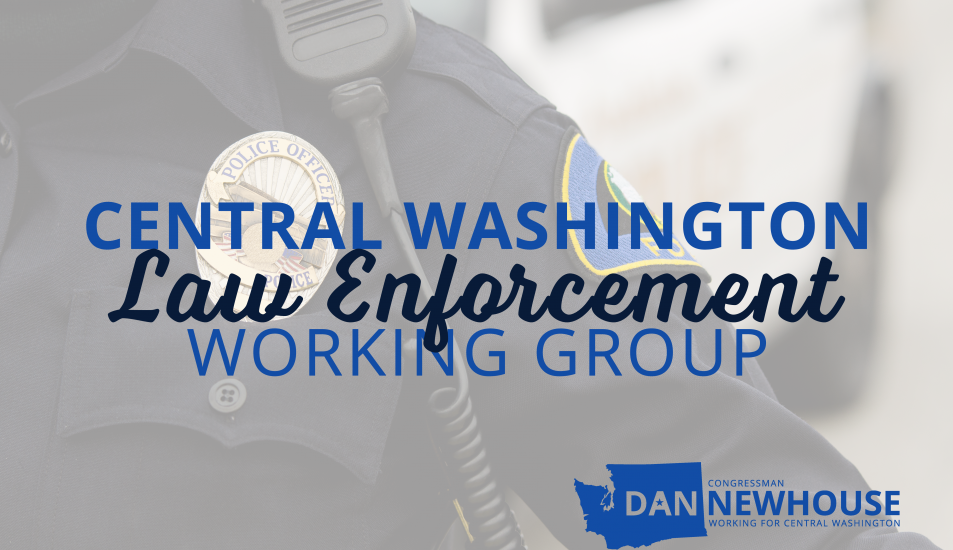Newhouse Establishes Central Washington Law Enforcement Working Group

Group to discuss local and community-led efforts to improve policing, pending federal legislation
WASHINGTON, D.C. – Today, Rep. Newhouse (R-WA) announced the establishment of a Central Washington Law Enforcement Working Group, which aims to build upon local and community-led efforts to improve policing and discuss pending federal legislation. Following the Working Group's inaugural meeting, Rep. Newhouse released the following statement:
"Restoring peace and delivering justice for all are ideals inherent to our nation's founding that I fully support, and it starts by engaging with our local communities," said Rep. Newhouse. "In response to the events and discussions happening on the national stage, I established the Law Enforcement Working Group to hear firsthand from these leaders in our communities. Central Washington's law enforcement officers have sworn to protect and serve our families, friends, and neighbors; I am hopeful this Working Group will open a line of thoughtful, respectful dialogue as Congress considers legislation that will affect the way our officers work to enforce the rule of law."
Rep. Newhouse continued, "I am grateful for the work of our police officers and sheriffs as they respond to the increase in crimes we have seen as a result of our response to COVID-19, and I applaud their defense of Central Washington's First Amendment rights as witnessed at peaceful protests throughout our communities. I will continue to work to ensure we maintain a just and civil society through law and order."
The Central Washington Law Enforcement Working Group is comprised of representatives from police and sheriff's offices from across Washington's 4th Congressional District. See below for a list of participants:
Chief Ken Hohenburg, Kennewick Police Department
Chief Greg Cobb, Union Gap Police Department
Chief Phil Schenke, Othello Police Department
Chief Kevin Fuhr, Moses Lake Police Department
Chief Paul Budrow, Twisp Police Department
Chief Matt Murray, Yakima Police Department
Captain Shawn Boyle, Yakima Police Department
Chief Ken Roske, Pasco Police Department
Chief Al Escalera, Sunnyside Police Department
Sheriff Tony Hawley, Okanogan County Sheriff's Department
Throughout the first meeting, Rep. Newhouse listened to law enforcement officers about steps currently being taken to improve policing throughout Central Washington, including the implementation of several Washington state laws and provisions that are being discussed at the national level. Participants shared positive examples of steps their departments are taking to increase community involvement in policing, outreach to minority communities, and crime prevention activities with children, students, and families. They also discussed the recent increase in crime, such as domestic violence, burglary, and driving under the influence, resulting from the stay-at-home order.
Additionally, Rep. Newhouse gathered input and feedback from the Working Group on legislation introduced in Congress.
Background:
In 2018, Washington state voters passed Initiative 940, which modified the law regulating police use of force. I-940 removed the requirement to prove that a law enforcement officer acted out of "malice" when filing criminal charges such as manslaughter. In addition, I-940 requires law enforcement officers to receive additional de-escalation, first aid, and expanded mental health crisis training.
In 2019, the Washington State Legislature passed legislation to clarify and strengthen I-940 by passing HB 1064:
- Require annual training for law enforcement, including training on implicit bias, de-escalation tactics, mental health, and less lethal alternatives;
- Establish that law enforcement officers have a solemn duty to preserve life, including providing or summoning first aid at the earliest safe opportunity;
- Institute processes for independent investigations of deadly force incidents;
- Establish standards for family and community notification, including a requirement to notify tribes if an officer's use of force results in the death of a tribal member; and
- Remove the requirement that police "malice" be proven in order to bring criminal charges and replace it with an objective "good faith" or reasonable police officer standard by which prosecutors can more fairly evaluate deadly force incidents.
In 2002, Washington state enacted a law to require Peace Officer Certification, which aims to ensure that law enforcement agencies do not hire or retain officers who:
- Have been discharged by a law enforcement employer for serious misconduct
- Have convictions for certain criminal offenses
- Have otherwise improved themselves to be unsuitable to be peace officers
Learn more about Rep. Newhouse's support for law enforcement here.